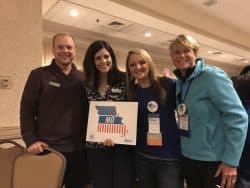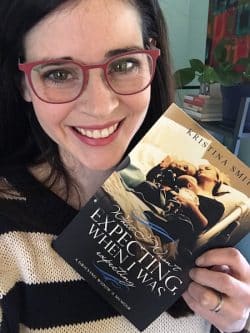I met Kristina a few years ago at a meeting for people 7 Billion Ones featured, she quickly told me she was widowed at age 25 after her husband's stage 4 colorectal cancer diagnosis. Our paths soon wove together as she became a Fight CRC advocate. She recently released a book that gives an honest look at her story - a tale of love, pregnancy and loss. She's a pillar of hope for anyone walking through such a hard circumstance. For more about Kristina, follow her Facebook group!

Q. When did you get the idea to write a book about your experience?
My husband randomly told me during our colon cancer fight that we would write a book one day. Shocked, I asked him: "About what?" His response, "This. Us. All of it."
Floored, I thought of my teaching career and coaching basketball; being a new mom and his caregiver; and trying to keep with our day-to-day life. I shook my head, thinking he was crazy.
He was right though.
About eight months after he passed, I sat down with my computer and started typing. Writing has always been an outlet for me. Documenting each step truly allowed me to process and heal, as our journey seemed to be in fast-forward mode from the day we walked into the hospital.
Once I started writing, I knew I couldn't stop. I knew I was going to publish one day.
Q. Caregivers can struggle to identify their own needs, what has helped you identify what you need to grieve and heal?
I desperately struggled to identify my own needs. I had a brand new baby and a sick husband, nothing was about what I needed. I didn't want it to be about me either.
About three months after Joe passed away, I knew something had to give.
I wasn't sleeping, if I did nod off, I would have nightmares. And the paranoid thoughts, the racing heart, the anxious mind, I knew I needed an outlet.
Each time I sit down to write, whether on my book, in one of my four journals, or blogging, I ALWAYS feel better! I feel joy, peace, and a deeper connection to my husband that I miss.
Having a joyful heart, even if there are tears rolling down my cheeks at the same time, is what started healing for me. I am so grateful for this outlet.
Q. What's some of the best advice on grief you've received?
I have received a lot of advice - especially in grief. Most is very cliche, and because it is, it only made me more angry when people with great intentions said it.
The very best piece of advice I have ever received is this:
"It hurts this much because you loved each other that great.
WOW! Think about it.
In that moment of advice, I realized something: I would never, not in a million years, trade less love just so grief would be easier or less painful. Once I realized that, I started thanking God for my pain, rather than asking him "Why?" I am grateful every day He sent me the man who loved me the way he did, even if I felt that time was too short.
Q. If someone wants to support a friend or family member who lost a loved one, what are some practical ideas and ways to do that?
BE THERE. I know this sounds silly, but I get asked that question a lot.
Just be.
"Just being" is a very hard concept for anyone, especially in our society.
I have already caught myself in this situation, of wanting to "do" something, anything to help. But when I think of what others did for me that helped, they didn't offer help, they didn't say, "Let me know," they showed up, and they just sat there.
Sometimes they showed up with a coffee, or dinner, but they didn't ask. One of my greatest friends said to me, "When I ask or suggest to you to let me know what you need, that puts the burden on you. When I just show up with your favorite drink or dinner, it allows me to take an added stress off of you."
She is right - and those words ring true, without even realizing the added stress others would put on me - unintentionally of course.
Show up, just sit. If you notice someone grieving just sitting on the couch, sit there and listen too.
Please don't say anything, just listen. Cry with them. That same friend is a prime example of the best thing I ever received. She met me where I am, on any particular day. THAT is what people in grief need.
Q. What should NOT be said to someone who just lost a loved one?
"Everything happens for a reason."
"God won't give you more than you can handle."
"God needed them more than you did."
"He's at peace now."
I am sure the list can go on.
All of these things are cliche, first off. As a wordsmith - I am always looking for something a little more insightful, anyways. But the reality of these phrases can easily be interpreted by those in grief as:
"So, God is allowing my son to grow up without his dad for a reason?"
"Nowhere in the Bible does it say God won't give us more than we can handle - there are too many examples of people not being able to handle what has been dealt to them."
"God needing someone more than my small child needs his dad? WHAT?"
I give all of those examples to say be gentle, even with the best intentions of words. LISTEN.
I have a fix-it personality. I want to say anything to comfort someone hurting. But I have also said there is NOTHING anyone can say or do to make it better.
Just listen, even if it is awkward silence for moments, just listen. Reassure the one grieving you love them, care for them, and are there for them, not judging any emotion they are having.
Q. How do you talk about your late husband with your son?
We talk every day about Daddy. I have never given a second thought about including Joe in our conversations.
For example, at our most recent Parent Teacher Conference, our son's teacher highlighted how kind he was to all of his friends in his class. Looking at him, I told him, "Daddy and I are very proud of you, do you know that?"
I include Daddy in every one of our conversations - good, bad, and random.
If we are eating somewhere or go somewhere, I say, "Oh Daddy loved to eat here." Or, "Daddy and I came here once and we...."
It has never been an option for me to let Joe die. And people only die if we stop talking about them.
I never thought it would be fair that Porter had to lose his dad twice, in the physical sense, and in the spiritual sense.
I often laugh as I tell people, "If you didn't know Joe passed away, and you didn't know us, you would think we are a normal, living family of three the way we talk."
It is true, he is ever present with us. Porter knows that Daddy is in Heaven with Jesus, and he still is confused about why Daddy can't come down to see us, or why we can't call him at his developmental age.
I continue to reassure him that we will see him again one day, and we talk about him or watch home videos to help with that void as we both are sad we can't hug him.
Q. What do you hope the book accomplishes?
I hope it brings healing to others.
I hope that someone else in the battle of cancer, as a fighter or caregiver, will recognize there are so many blessings along the way. I hope that it reaches someone else that feels alone in their fight - rather it be support, or because of their young age, or their family dynamics - whatever.
I hope it brings awareness that colon cancer is being diagnosed and is on the rise in young people.
I hope it opens conversations about grief - and the normalcy of it.
We all are going to grieve about something, that is a guarantee. We need to open conversations about that and not continue to stigmatize grief in society.
Most of all, I hope that as readers are turning the pages, they remember everyone is fighting a battle others know nothing about, and that we all need to love each other well.
There is good in this world, and we need to be the good - focusing on the good instead of the bad.
Q. Any advice for people who also want to write a book about their loss?
DO IT! My intent for this book was to heal, not to sell a bunch of copies.
If writing is your creative outlet, sit down and start typing, but give yourself grace.
When I originally started this passion project, my goal was to type, edit, and publish in one summer. I reflect and giggle at myself. Here's why: As I began to chronologically process our story, there was some deep stuff I had to wade through and process.
There were times that I would cry so hard, I couldn't breathe as I relived these moments. And with that, I would shut my computer and not go back to it, KNOWING what I was going to be walking back into.
Sometimes my avoidance would last a few months. Other times, I could jump back in within a few days. Give yourself grace - allow it to be a healing tool and process, and allow God to carry out His timing in all of it.
It will be done when it is supposed to be. Listen to your heart and follow it. It never serves you wrong.
Q. What's your favorite baked good?
No time to think needed here, I LOVE banana bread.

Check out Kristina's Book!
This book is honest, real and raw as Kristina tells what happened as she faced stage IV colorectal cancer with her husband. Her story of becoming widowed at age 25 gives a much-needed perspective into what it's like for caregivers. Her words are an anchor to others facing grief - it's OK to open up, process and heal. Check out What I Wasn't Expecting When I Was Expecting: A Grieving Widow's Memoir.
Want to read more colon cancer book interviews? Check out my Q&As with Dr. Jamie Aten & Molly McMaster Morgoslepov.

Leave a Reply